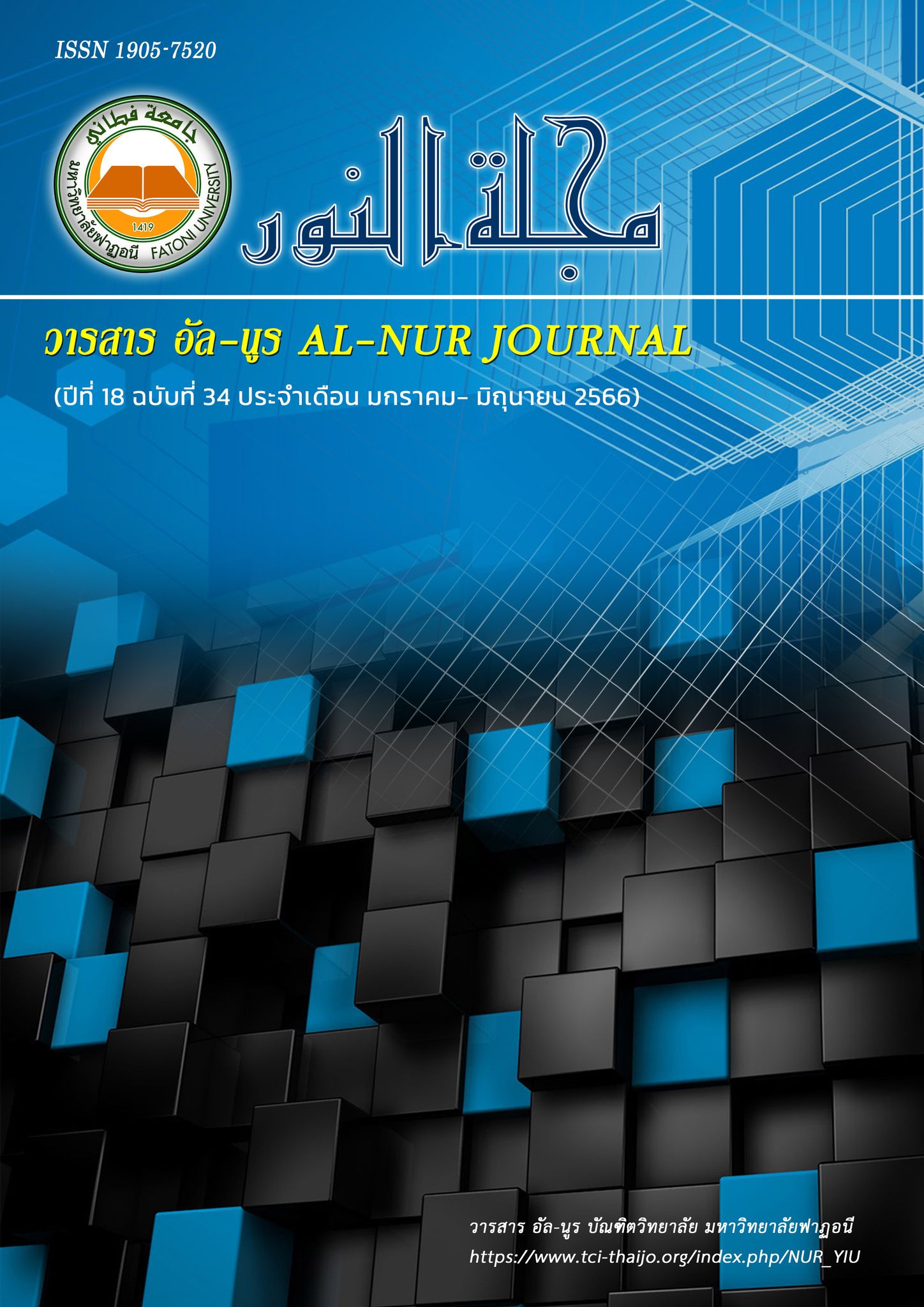การประยุกต์ใช้จิตสาธารณะตามหลักการอิสลาม
Keywords:
Public mind, Islamic principle, MuslimsAbstract
Abstract
This article is a documentary study. Its objectives are; 1) to study the theoretical definition regarding public mind, and 2) to analytically study the application of the public mind based on Islamic principle. The study uses qualitative research mainly relying on data from the primary sources such as the Holy Quran and the Prophetic Traditions and the secondary sources such as books, internet publications, academic articles, documents and various researches related. The findings are as follows:
- Public mind is Muslims’ important awareness of problems arising in society, causing the desire to help society, wanting to solve crises by recognizing rights along with duties and responsibilities based on religious principle. The way of applying public minds by Muslims in society can be done through living in reality, inculcating, educating and training. These things would gradually convince the person to accept and apply awareness and public mind in his life. Therefore, many social institutions, including family institutions, educational institutions, religious institutions and mass media institutions, have to come together to create public consciousness of people in society, and;
- The application of the public mind in Islam requires the application of religious teachings in real life for the maximum benefit of society. Since being public minded and helping others is an Islamic virtue and goodness. Islam, therefore, calls Muslims to promote public mind and help one another in doing all goodness through sharing labor, speech, food, property, knowledge, and help one another all other worldly and religious affairs. And application of public mind starts with kindness, mutual sharing, not taking advantage of others, and giving more importance to the common interests than the personal. Therefore, applying these teachings in the field of public mind is one of the ways to help and develop the society further.
References
เอกสารอ้างอิง
กรรยา พรรณนา. (2559). จิตสาธารณะ สร้างได้ง่ายนิดเดียว. กรุงเทพฯ : สํานักพิมพ์แห่งจุฬาลงกรณ์
มหาวิทยาลัย.
บรรจง บินกาซัน. (2547). สารานุกรมอิสลามฉบับเยาวชนและผู้เริ่มสนใจ. กรุงเทพฯ : สำนักพิมพ์
อัล อะมีน.
บาหรี ม่าเหร็มและคณะ. (2539). บทธรรมเทศนาวันศุกร์. สตูล : โรงพิมพ์เมื่องสตูล.
ปัญญา รุ่งเรือง. (2562). จิตสาธารณะ: แนวคิดพื้นฐานและการจัดการเรียนรู้เพื่อพัฒนา และปลูกฝังจิต
สาธารณะให้แก่ผู้เรียน. นครปฐม : มหาวิทยาลัยราชภัฏนครปฐม.
แผนงานสร้างเสริมสุขภาวะมุสลิมไทย. (2552). รวมคุตบะห์เพื่อสุขภาวะ. กรุงเทพฯ : สำนักงานกองทุน
สนับสนุนการเสริมสร้างสุขภาพ.
--------------------------------------------. (2548). รวมคุตบะห์เพื่อสุขภาวะ เล่ม1. กรุงเทพฯ : สำนักงาน
กองทุนสนับสนุนการเสริมสร้างสุขภาพ.
เมาลานา ซัยยิด อบุล อะลา เมาดูดี. (2545). ตัฟฮีมุลกุรอ่าน. แปลโดย บรรจง บินกาซัน : บริษัท ออฟ
เซ็ทเพรส จำกัด.
อับดุลรอชีด เจะมะ. (2542). สังคมอิสลาม. ปัตตานี : มหาวิทยาลัยสงขลานครินทร์.
อับดุลเลาะ การีนา. (2555). หลักการอิสลาม. ปัตตานี : มหาวิทยาลัยสงขลานครินทร์.
อบูรุสดี้. (2562). จิตอาสา : หนึ่งในหนทางสู่สวรรค์ของอัลลอฮ์. กรุงเทพฯ : มูลนิธิศรัทธาชนเพื่อ
การศึกษาและเด็กกำพร้า.
อรัญญา ตุ้ยคัมภีร์ และจิระสุข สุขสวัสดิ. (2559). จิตวิทยาเพื่อการพัฒนาตนและการสร้างสรรค์สังคม.
นนทบุรี : สำนักพิมพ์มหาวิทยาลัยสุโขทัยธรรมาธิราช.
Ibn Kathir, Abu Fidaa’ Ismaiil bin Kathir Alqurashi. (2010). Tafsir al–Quraan al–‘Azim
(تفسير القرآن العظيم) . Vol. 1. 6. Beirut: Maktabat al–Asriyah.
al–Qurtubiy, Abi Abdullah .2006. Tafsir al–Qurtubiy (تفسير القرطبي). Beirut : Dar Ihya’
al– Turath al–Arabiy.
Muhamad bin Iibrahim al-Tuwijiri. 2009. Al-Hibah walsadaqah (الهبة والصدقة). al-Saudiyah :
Dar al-rabwah.
Muslim Ibn Hajjaj. (1955). Sahih Muslim (صحيح المسلم). Beirut: Dar Ihya’ al–Turath al–‘Arabi.
Sayyid Sabiq, 1971. Fiqh al-Sunnah (فقه السنة). s.5. Beirūt : Dar al-Fikr.
https://www.islammore.com/view/4252- สืบค้นเมื่อ 20/01/2022.
https://delphipages.live/th- สืบค้นเมื่อ 23/01/2022.
Downloads
Published
Issue
Section
License
Copyright (c) 2023 Thichakorn Jinda; Sarfee Ardam

This work is licensed under a Creative Commons Attribution-NonCommercial-NoDerivatives 4.0 International License.
Proposed Creative Commons Copyright Notices


